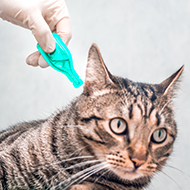iCatCare supports the responsible use of parasiticides in cats

"While cats are likely to be lower contributors to this environmental contamination, effort should still be made to reduce the impact they do have" - Nathalie Dowgray, head of ISFM.
Cat welfare charity International Cat Care (iCatCare), and its veterinary division, the International Society of Feline Medicine (ISFM) is supporting the British Veterinary Association (BVA) on the responsible use of parasiticides in cats.
As major veterinary organisations in the UK have highlighted, parasiticides commonly used in companion animals risk contaminating waterways and causing harm to invertebrates, wildlife and ecosystems.
ISFM/iCatCare is supporting the policy position outlined by the BVA, British Small Animal Veterinary Association (BSAVA), and British Veterinary Zoological Society (BVZS), which advocated for the responsible use of parasiticides for cats and dogs.
In a position statement on its website, iCatCare outlines key considerations and advice for both veterinary professionals and cat caregivers. In its considerations for veterinary professionals, iCatCare/ISFM recommends that an individual risk assessment should be performed on each cat before a parasiticides are prescribed, and that this should be reviewed on an annual basis.
Other key considerations outlined for veterinary professionals are that consideration should be given to the type of product prescribed (single ingredient of multi ingredient and route of administration), and that veterinary professionals should advise owners on how to apply topical medication to reduce contamination to the wider coat and physical environment.
For cat caregivers, the charity suggests not bathing cats unless necessary for a specific medical problem, disposing of cat urine or faeces appropriately, seeking advice from a veterinary surgeon to assess each cat's risk and need for parasite control, and learning how to apply topical parasiticides correctly.
Head of ISFM, Nathalie Dowgray, said: “While cats are likely to be lower contributors to this environmental contamination because they are less likely to be bathed or to swim in waterways, effort should still be made to reduce the impact they do have.”
BVA president Justine Shotton commented on iCatCare and ISFM's support: ‘Veterinary professionals have a role to play in protecting the environment, so BVA welcomes this supportive statement from iCatCare and ISFM.
“It is really positive to see another organisation providing advice and guidance to veterinary professionals and highlighting the challenges around these medicines.
“We believe it’s vital to continue to encourage discussion within the sector on the impact parasiticides can have on the planet and how best to use them responsibly.”



 The latest
The latest